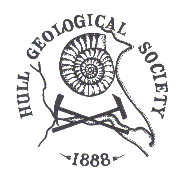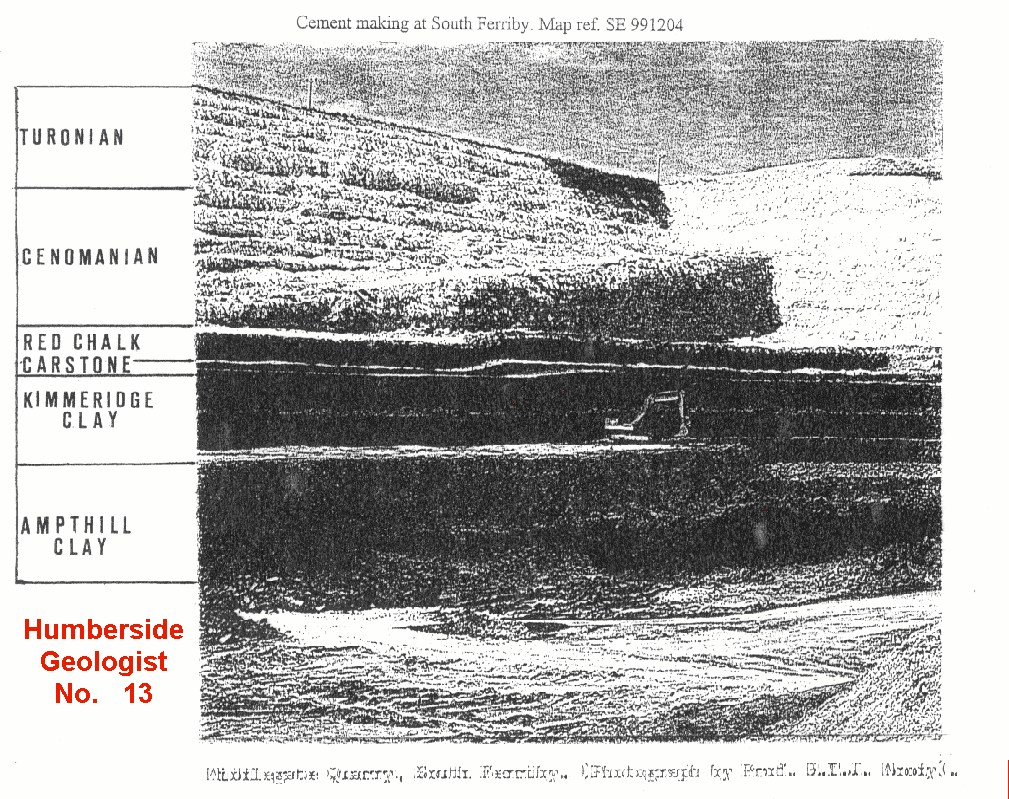
Humberside Geologist No. 13
Cement making at South Ferriby, N. Lincolnshire

Humberside Geologist No. 13
Cement making at South Ferriby, N. Lincolnshire
by Petar Vjestica, Works Manager, Rugby Cement Works, South Ferriby.
and
The Geology and some recorded fossils from South Ferriby Quarry
by Felix Whitham
In past issues of Humberside Geologist very little has been published about how the rocks and clays we all keenly examine, describe and extract fossils from, are utilised and manufactured into a vast variety of materials and other essential everyday products. It is therefore a refreshing change to be able to publish details from a leaflet on Cement Making prepared by Petar Vjestica the Works Manager of Rugby Cement at South Ferriby in North Lincolnshire. The chalk and clays used in the manufacture of cement are extracted from their Middlegate Lane Quarry near to the main works. The following 10 figures which make up the leaflet are reproduced here, with slight modifications to Figure 3 to include some geological features.
figure 1; figure 2; figure 3; figure 4; figure 5; figure 6; figure 7 ; figure 8; figure 9; figure 10
As a Geological Society we are pleased to have the opportunity to publish this excellent transcript (with permission by Petar) and at the same time express our sincere thanks to the management of Rugby Cement for allowing our members to visit the quarry over a period of many years for research purposes and to collect fossils.
My own experience with South Ferriby quarry dates back to the early 1950s before the works and quarry was taken over by Rugby Cement in 1962 and of course long before the Humber Bridge was built which meant a long journey from Hull via Goole. Eastwoods Humber Cement, the previous owners, first started operations in 1938 and in those days chalk was dug by hand and transported to the works from Middlegate Lane by overhead bucket container over a distance of 1.5 km. Clay, mostly Boulder Clay, was extracted from pits behind the works and moved via a narrow gauge railway system. At that time the first excavation of chalk was from the flinty part of the Turonian lower Terebratulina lata Zone and later from the flintless Mytiloides labiatus Zone, subsequently penetrating about 22 metres of Cenomanian, flint-free, mostly greyish chalk.
I was fortunate to be able to observe some of the steady increase in the depth of the quarry which accelerated rapidly following the take over by Rugby Cement in 1962, when a new high speed conveyor belt with a capacity of 4 000 tonnes a day replaced the old bucket system and a new 1 000 tonnes a day kiln, complete with the latest technology in chalk and clay grinding was installed in 1967. Output was doubled in 1973 with the introduction of more advanced technical equipment allowing a rapid increase to take place in chalk extraction which quickly reached the Lower Cretaceous Red Chalk and Carstone deposits, which although not suitable for cement making are utilised for stabilizing old workings and for back-fill. The underlying Upper Jurassic Kimmeridge and Ampthill Clay was soon exposed making it possible for the first time to provide both clay and chalk from within the confines of the quarry. At the present time 16 to 18 metres of clays are worked and the Oxfordian/Kimmeridgian boundary can be observed about 8 metres above the floor of the quarry.
Varying quarry operations at different horizons over a period of many years has enabled the writer to log the succession in considerable detail and at the same time collect and record fossil horizons (see enclosed Figure and list of fossils). A full report was first published in Humberside Geologist No. 10 1992, from which further more detailed information can be obtained.
List of recorded jurassic and cretaceous fossils FROM THE MIDDLEGATE QUARRY, SOUTH FERRIBY, N. LINCS.
UPPER CRETACEOUS CHALK : TURONIAN
Mytiloides labiatus & Terebratulina LataZones
|
Ammonites Mammites nodosoides (Schluter) Lewisiceras peramplum (Mantell) Watinoceras sp. Echinoids Hemiaster nasutulus Conulus castenea Conulus subrotundus Mantell |
Bivalves Mytiloides labiatus (Schlotheim) Inoceramus lamarcki (Parkinson) Inoceramus ? striatoconcentricus Inoceramus sp. ? brongniarti group Brachiopods Orbirhynchia cuvieri (d’Orbigny) Gibbithyris sp. Concinnithyris sp. |
CENOMANIAN
Holaster subglobosus & Holaster trecensis Zones
|
Ammonites Parapuzosia (Austiniceras) austeni (Sharpe) Acanthoceras rhotomagense (Brongniart) Acanthoceras (A..) rhotomagense jukesbrownei Spath Schloenbachia varians (J. Sowerby) Turrilites costatus Lamarck Hypoturrilites ? acutus Passy Nautilus sp. Bivalves Aucellina coquandiana (d’ Orbigny) Inoceramus crippsi Mantell Inoceramus shondorfi Woods Inoceramus brongniarti group Inoceramus conicus Gueranger Inoceramus pictus J. de C. Sowerby Entolium orbiculare (J. Sowerby) Limaria elongata (J. de C. Sowerby) Lyropecten (Aequipecten) Woods Pycnodonte vesicularis Lamarck Plagiostoma globosa J. de C. Sowerby Oxytoma sp. Turnus sp. Gastropods Pleurotomaria perspectiva (Mantell) |
Brachiopods Concinnithyris subundata (J. Sowerby) Concinnithyris sp. Rectithyris sp. Ornatothyris sulcifera Gibbithyris sp. Kingena concinna Owen Terebratulina etheridgei Owen Orbirhynchia mantelliana (J. de C. Sowerby) O. multicostata Pettitt O. wiesti (Mantell) Terebratulina sp. Belemnites Actinocamax primus Arkhangelsky Actinocamax plenus (Blainville) Belemnocamax boweri Crick Neohibolites ultimus (d’ Orbigny) Echinoids Echinocorys spherica Schluter Camerogalerus cylindrica Hemiaster griepenkerli Agassiz Holaster subglobosus Leske Holaster trecensis Holaster sp. undescribed Salenia petalifera Goldfuss |
ALBIAN RED CHALK
Mortoniceras inflatum & Hopolites dentatus Zones
|
Ammonites Anahopolites planus (Mantell) Dimorphoplites cf. hilli Leymeriella sp. Nautilus sp. Bivalves Birostrina concentricus Parkinson Birostrina sulcatus Parkinson Inoceramus anglicus Woods Inoceramus lissa (Seeley) Inoceramus ? tenuis Entolium orbiculare (J. Sowerby) Pycnodonte vesicularis (Lamarck) Aucellina coquandiana (d’ Orbigny) Plicatula gurgitis Pictet & Roux Belemnites Neohibolites minimus (Miller) Neohibolites attenuatus (Miller) Neohibolites oxycaudatus Spaeth Serpulids Rotularia unbonata (J. Sowerby) |
Brachiopods Boubithyris sp. Concinnithyris cf. subundata (J. Sowerby) Platythyris capillata d’Archiac Moutonithyris dutempleana d’Orbigny Ornatothyris sp. Kingena sp. Terebratulina etheridgei E.F. Owen 1988 Cyclothyris sp. Rectithyris sp. Echinoids Hemiaster morrisii Woodward Epiaster sp. Crinoids Isocrinus cf. cretaceous Isocrinus sp. Corals Podoseris sp. Trochocyathus sp. Vertebrates Sharks teeth Fish vertebra |
LOWER ALBIAN CARSTONE
Douvilleiceras mammillatum & Leymeriella tardefurcata Zones
|
Ammonites Leymeriella sp. Derived Jurassic spp. Vertebrates Derived reptile vertebra Belemnites Neohibolites minimus (Miller) Neohibolites attenuatus (Miller) Neohibolites m. pinguis Stolley |
Bivalves Aetostreon latissimum (Lamarck) Entolium orbiculare (J. Sowerby) Inoceramus ? salomoni Neithea sp. indet. Rastelllum colubrina (Lamarck) Brachiopods Burrirhynchia leightonensis Walker Cyclothyris mirabilis (Walker) Modestella festiva Owen |
UPPER JURASSIC KIMMERIDGE CLAY
Pictonia baylei & Rasenia cymodoce Zones
|
Ammonites Amoeboceras sp. Pictonia baylei Salfield Perisphinctes sp. Rasenia cymodoce Spath Brachoipods Rhactorhynchia inconstans (J. Sowerby) Reptiles Plesiosaurus cervical vertebra Ichthyosaurus caudal vertebra |
Bivalves Camptonectes sp. Deltoideum delta (W. Smith) Myophorella sp. Pleuromya uniformis (J. Sowerby) Pholadomya sp. V. Large specimens Oxytoma expansum (J. de C. Sowerby) Gastropods Dicroloma sp. Others Serpulid |
AMPHILL CLAY
Ringsteadia psudocordata Zone
|
Ammonites Amoeboceras glosense (Bigot & Brazil) Divisosphinctes sp. Decipia decipians (J. Sowerby) Persphinctes sp. Ringsteadia spp. Belemnites Pachyteuthis abbreviata Others Serpulid |
Bivalves Deltoideum delta (W. Smith) Myophorella sp. Pleuromya uniformis (J. Sowerby) Oxytoma expansum (J. Sowerby) Pholadomya sp. Thracia depressa (J. de C. Sowerby) Gastropods Dicroloma dispansum Bathrotomaria recticulata (J. Sowerby) |

(c) Hull Geological Society 1999 + 2001
copyright Hull Geological Society 2020